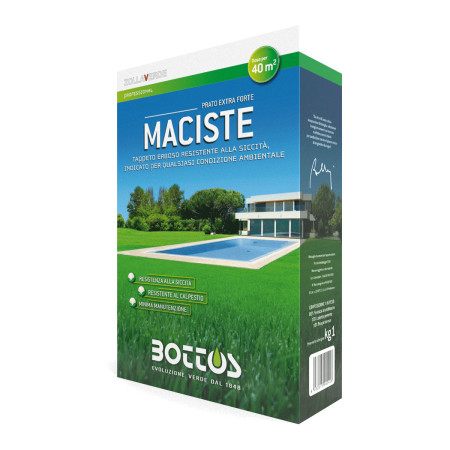Maciste - 1 kg lawn seed
Extra strong lawn.



The Maciste seeds from the Zolla Verde line by Bottos are a mixture of fescue arundinacea, poe pratensi and ryegrass, for the creation of turf for ornamental, sports and recreational areas.
Thanks to the new cultivars used, in particular of perennial ryegrass, Maciste is very fast in the initial planting phase, immediately occupying the empty spaces leaving no outlet for potential weeds.
Maciste seeds from Bottos allow you to create a bright green turf with a medium-coarse texture for Mediterranean-continental areas, hot, exposed to the south and with obvious problems of summer temperatures and risk of drought.
Maciste is also the right answer for any type of soil, also suitable for shade with up to 50% less direct light and therefore suitable even for the shade of conifers.
These seeds are tolerant to summer brown spot.
The 1 kilogram bag allows you to sow up to approximately 45 square meters of surface area.
Germination occurs 4-10 days after sowing. It can be sown from March to October.
- Festuca arundinacea (%)
- 80
- Perennial ryegrass (%)
- 10
- Poa Pratense (%)
- 10
- Months of sowing
- Mar, Apr, Mag, Down, Ago, Set, Oct
- Sectors of use
- Recreation areas, Ornamental, Sports surfaces, Sea areas
- Dosage
- 40-50 g/m2
- Species
- microtherm
- Resistance
- Great
- Weight kg)
- 1
- Packaging
- box
| Ground | Deep, draining, medium-textured, but also clayey and/or loose, with a pH that can range from alkalinity to sub-acidity. |
| Sowing period | From March until late October (skipping the months of maximum summer heat). Germination can take from 4 to 10 days in direct correlation with soil temperatures (soil temperature required above 8°C). |
| Recommended dosage | 40-50 g/m2. The maximum doses are recommended in case of overseeding with high temperatures and/or imperfect tillage of the seed bed. |
| Cut | Carry out the first cut when the grass reaches 6 cm and then bring it to 4 cm, so as not to limit the germination of Poa pratensis. Never remove more than 30% of the vegetation present. If you want a lawn with a finer texture, you can cut down to 35 mm, while above 45 mm the leaves remain larger. In the shade of conifers, do not cut below 60 mm in height. |
| Nutrition | Phosphate fertilization at sowing and then management of the turf at maturity with 20-25 units of nitrogen m²/year, choosing specific fertilizers for turf, preferably with controlled release. Schedule 4 annual fertilizations. |
| Irrigation | When planting, keep the seedbed constantly moist so as not to stop the germination process. In the summer period, irrigate with 10 mm of water every 2-3 days. Pay attention to water management, not exaggerating with the quantities and frequencies of distribution in the hottest periods to avoid encouraging the onset of potential seasonal diseases. In case of shade from pine trees, double the wetting times in the hottest periods. |
| Phytostimulation | Plan at least 2 biostimulant treatments between July and August to increase tolerance to heat and trampling. |
| Regeneration | Use Maciste during the regeneration phase at the end of summer and/or at the end of winter, carrying out a verticut with the removal of the felt and subsequent distribution of approximately 40-50 g/m2 of mixture. |














